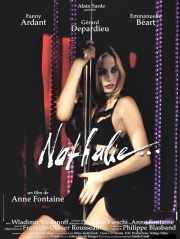|
Nathalie... |
| |
 |
France/Spain, 2003. Not rated. 100 minutes.
Cast: Fanny Ardant, Emmanuelle Béart, Gérard Depardieu, Wladimir Yordanoff, Judith Magre, Rodolphe Pauly
Writers: Jacques Fieschi, Anne Fontaine, François-Olivier Rousseau
Music: Michael Nyman
Cinematography: Jean-Marc Fabre
Producer: Alain Sarde
Director: Anne Fontaine
LINKS
|
Catherine (Fanny Ardant) is an attractive woman with a great career and a seemingly solid marriage to Bernard (Gérard Depardieu), her husband of twenty-five years. Their lives seem to be going well until Catherine discovers that Bernard is having an affair. Realizing that she does not really know her husband or what he wants, Catherine hires Marlene (Emmanuelle Béart), a beautiful prostitute, to act as “Nathalie,” a woman who will seduce Bernard and extract answers to the questions that are obsessing her.
—promotional materials for Nathalie…
 h dear, it's a French Sex Movie. You can expect romantic love to be set aside, and the sexual act to become both a metaphor and an outlet for a host of personal dysfunctions that are actually a reflection of social ailments. The characters will have lots Meaningless Sex that takes on a Larger Meaning precisely because it is Meaningless. They will drone on about that Larger Meaning, or even better, express the Larger Meaning by exhibiting an escalating amount of random and self-destructive behavior, which usually involves more sex. If you're familiar with French cinema, you know the kind of movie I mean—from Belle du Jour to Romance, there's a long tradition.
h dear, it's a French Sex Movie. You can expect romantic love to be set aside, and the sexual act to become both a metaphor and an outlet for a host of personal dysfunctions that are actually a reflection of social ailments. The characters will have lots Meaningless Sex that takes on a Larger Meaning precisely because it is Meaningless. They will drone on about that Larger Meaning, or even better, express the Larger Meaning by exhibiting an escalating amount of random and self-destructive behavior, which usually involves more sex. If you're familiar with French cinema, you know the kind of movie I mean—from Belle du Jour to Romance, there's a long tradition.
Nathalie… looks like precisely that kind of movie. Something funny happens along the way, though. From director Anne Fontaine (Une Liaison Pornographique), Nathalie … doesn't turn out to be the stereotypical French Sex Movie at all. Rather, it develops into a sophisticated psychological film centered around an ambiguous relationship between two women who don't know exactly what they want from each other, just that they want it very much.

Fanny Ardant and Emmanuelle Béart play mind games in Nathalie... |
Fanny Ardant and Gérard Depardieu (incomprehensibly still referred to as an “attractive man” here) are Catherine and Bernard, a longtime married couple. When Catherine finds out that Bernard has been cheating, Bernard shrugs it off with, “It's too banal to talk about.” Even Catherine's mother shrugs it off. How French. But Catherine can't shrug it off. Her pain is profound and real, and out of morbid curiosity she becomes desperate for the details of Bernard's liaisons. She needs to know exactly what drives Bernard to betray her. Catherine being a gynecologist (which implies a clinical approach to sex), she adopts a clinical approach to the problem. She approaches a prostitute, Marlene (Emmanuelle Béart), to pose as a woman named Nathalie, seduce Bernard, and get some answers.
The movie sticks obstinately to Catherine's perspective, which requires the audience to receive information in the same way she does. Thus, Fontaine doesn't actually show us Marlene's interactions with Bernard, choosing instead to focus on Catherine and her state of mind, which grows increasingly unsettled. Marlene's stories about Bernard grow wilder and wilder. She assumes Catherine finds it all to be a big voyeuristic turn-on, until something unexpected happens…not to Catherine or Marlene, but to “Nathalie,” who takes on a life of her own.
The surprise here is that the film is not about Catherine and Bernard, or about Marlene and Bernard. In fact, Bernard turns out to be only tangentially relevant to the development of the film's central relationship, between Catherine and Marlene. Eventually it becomes obvious that Catherine is drawn to Marlene specifically, not just because this happens to be the woman Catherine chose to perform an unusual task. Why? Will the lesbian subtext ever become overt? Soon it's Catherine making excuses to get away from Bernard to visit Marlene, and Bernard wondering why his wife has become so distant, rather than the other way around.
The film's considerable eroticism is all in the atmosphere and the dialogue. The words, as conveyed by the enigmatic performances of the two female stars (who suggest far more than they ever say), create complicated expectations, and we can't wait to find out if they will be fulfilled. Fontaine plays tiny mind tricks on the audience to accentuate the highly charged atmosphere—on several occasions, for example, you think a character is waiting for one person, but the other arrives. Leonard Cohen's Boogie Street and other well-chosen brooding tracks enhance the film's dark, languid mood. The worst you can say about Natalie … is that the plot twist is easy to predict, that it drags on a bit with some repetitive story beats, and that the English subtitles are inadequate, leaving out subtleties of meaning and even entire phrases. These are minor quibbles. Fontaine invites audiences to get lost in a sumptuous, sinister psychological maze, and it's a genuine pleasure to accept her invitation.
Review
© December 2004 by AboutFilm.Com and the author.
Images © 2004 Wellspring Media, Inc. All Rights Reserved.


